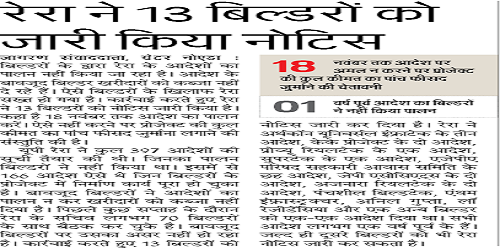For Amol Nizapkar, an executive with a wealth management firm in Mumbai, the wait for the new regulatory regime has been worth it. “Now every detail about a project is well-documented. There is an obligation on part of the developer to complete the project on time or pay the penalty for delays,” says Nizapkar, who recently bought an apartment in Mulund, Mumbai. “Earlier, we used to pay the booking amount and were not aware when the project is going to be completed.”
However, not every prospective home buyer is happy. “We have been visiting developers for more than two months. Most of the projects are still not Rera-registered,” says Devendra Vijay Warghiya, an employee with a Mumbai-based textile firm. Warghiya has decided to postpone his decision to buy a house until Diwali. “We expect Rera to get fully implemented by that time. Hopefully, the developers will also offer some festival discounts,” he adds.
The Real Estate (Regulation and Development) Act, 2016, (Rera) ushered in a new regulatory regime on May 1 this year. A hundred-odd day later, the regulatory structures are still falling in place. Experts say one of the reasons for the mixed feeling among buyers about the new regulatory regime has been its patchy implementation across states over the last four-odd months.
Different states, different strokes
As of now, 23 states and Union Territories out of 35 (excluding Jammu & Kashmir) have notified the rules. A total 13 states and six UTs have formed interim regulators, while four states -Punjab, Maharashtra, Gujarat and Madhya Pradesh – have formed permanent regulators. States such as Goa, Himachal Pradesh, Kerala, Telangana, Tripura and West Bengal have finalised the draft rules, but are yet to notify them. Uttar Pradesh, on the other hand, is planning to re-notify the rules on the lines of those framed by the centre.
The six north-eastern states of Arunachal Pradesh, Manipur, Meghalaya, Mizoram, Nagaland and Sikkim have some Constitutional issues around ownership of land. This matter is still under examination.Just seven states have started the process of online registration of real estate projects and agents. As per the Act, states can set up their respective websites within one year from the establishment of regulatory authorities.
Till that time they are allowed to register projects offline. One issue that has been confounding many stakeholders is that different states have interpreted and enacted their own versions of the central Act. Nowhere is this problem more manifest than in the residential real estate market in the National Capital Region (NCR).
According to Rohan Sharma, associate director at consultancy firm JLL India, under the influence of the builder lobby, many states have kept several on-going projects outside the purview of the new regulatory regime. For instance, in Uttar Pradesh and Haryana on-going projects that have completed development work and have applied for completion certificates are currently excluded from Rera coverage. This has led to confusion in the ranks of existing owners and prospective buyers.
To beat the onset of the new regulatory regime a number of developers in the NCR applied for completion certificates between October and November last year and received them over the subsequent months. Consultants point out that as many as 21,000 apartment units were completed in Noida and Ghaziabad over the last six months and another 7,500 in Gurgaon. These were handed over to the respective Resident Welfare Associations – even though in many of these projects the common facilities were not fully completed.
Amidst the regulatory flux developers too have cut down on new launches. The launch of new residential projects in top eight cities, Ahmedabad, Bengaluru, Chennai, Hyderabad, Kolkata, Mumbai, NCR and Pune, have come down by 41 per cent in first half of 2017, a seven-year low, according to a report by Knight Frank.
The confusion in the market has led to purchase decisions being postponed. This is more visible in the states that have diluted the provisions of the Central Act or are yet to implement it, points out Anuj Puri, chairman of ANAROCK Property Consultants. “The industry is also seeing a degree of consolidation,” says Puri.
Regulators still to find feet
In most states, the nascent real estate regulators are still in the process of finding their bearing. In Tamil Nadu, for instance, the government notified the rules in June this year making it mandatory for real estate agents and property dealers to register with the Tamil Nadu Real Estate Regulatory Authority (TNRERA). Of the 100-odd applications received, just six agents/firms in the state have enlisted with the realty watchdog. Till date, seven-odd projects have been registered with the state regulator, with 1,000-odd applications pending. Developers in the state blame this impasse for their inability to sell projects to buyers.
There are however a few regulators that stand out among the pack. Madhya Pradesh, one of the first states to constitute the regulatory authority, has registered around 700 projects, as of July 31. Madhya Pradesh Rera Authority is also among the first to have sent a notice to a developer on a buyer complaint, based on the new rules.
Maharashtra has been the frontrunner in implementing the provisions of the Act. The MahaRera, the state regulatory authority, has till date received over 12,000 applications for project registration. Out of these 5,000-odd have been duly registered. Maharashtra is estimated to have around 16,000 on-going projects on the ground. To nudge more developers to put up their projects up for registration – the deadline for which was July 31 – the state regulator has pegged a fine of Rs 50,000 for those that have missed the deadline, says MahaRera chairman Gautam Chatterjee.
Source From : www.business-standard.com/article/opinion/100-days-of-rera-confusion-in-market-led-to-purchases-getting-postponed-117082800012_1.html





